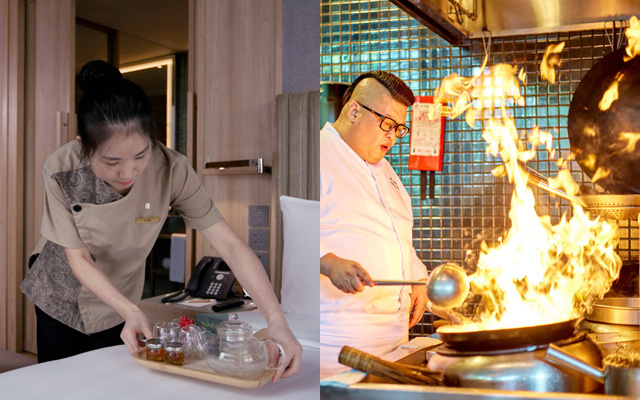Singapore-based Pan Pacific Hotels Group (PPHG) has entered the final lap of its research project to redesign key roles in hotel operations, conducted as part of the nation-wide Job Transformation Map (JTM) for the Hotel Industry programme led by the Singapore Tourism Board and Workforce Singapore.
PPHG’s three-year job transformation project involves human resource experts, Mercer, which was awarded the contract in January 2023 after two rounds of tender evaluations jointly performed by Singapore Tourism Board, Workforce Singapore, and PPHG on four tenderers. The three parties are jointly funding the project.

In an earlier interview with TTG Asia, PPHG CEO Choe Peng Sum had described the project as “a million-dollar exercise” to develop “a vision of the hotel of the future” through a practical redesign of jobs across various functions.
While the hotel industry-wide programme has identified 40 jobs ripe for various extent of redesign, such as sales coordinator, reservations officer and engineers, PPHG itself has marked out eight roles for scrutiny under its own job transformation undertaking. These roles are in front office, bell, concierge, housekeeping, central reservations, F&B, and security, according to Kung Teong Wah, general manager at Parkroyal Collection Pickering, one of three PPHG properties involved in the study.
Kung shared that research work has been intensive, with the team considering factors such as customer touch points, opportunities for change, and potential technology that could simplify jobs and improve staff capability. A time motion study was also conducted to better understand processes and identify necessary training.
Elaborating on the efforts taken to rethink the housekeeping role, Kung said the team “looked at the full range of necessary tasks and identified possible ones that a Singaporean could and would do” as well as how work could be simplified, and staff could be incentivised to perform faster and better.
Currently, room attendants are all foreigners, as “Singaporeans are not willing and able to do this job – for example, they are not able to carry heavy 46kg mattresses”, stated Kung.
By separating tasks that foreigners and Singaporeans could and would do, the hotel is able to move a percentage of local staff to housekeeping, which in turn eases the dependency on foreign hires and makes hotel jobs more palatable to the local workforce.
Kung’s team is also developing an incentive system that awards housekeepers extra pay should they complete more rooms within their normal working hours. To ensure that speed does not compromise quality of housekeeping, rooms are inspected and the incentive value is adjusted according to assessment.
“In the space of housekeeping alone, we have devised 16 action plans for this transformation journey. By implementing these plans, we have seen improvement in productivity,” Kung told TTG Asia.
“Another positive outcome of job transformation is the ability to expand staff capability. An assistant housekeeper, for example, is almost a managerial role. These individuals can articulate in English, are generally smarter, and can do service well. During peak hours, they could support operations at the executive lounge. Just by having them perform a high value job for two hours a day, their capability rises and they gain a wider set of work experience. Of course, everything comes with additional salary,” added Kung.
When asked if redesigned jobs would benefit mature workers, Kung said the employability of mature staff was one of the motivations of the project.
“We want our mature workers – whom we term young seniors – to remain employable for a longer time, especially as the retirement age rises and the population ages. Upgrading their skillsets is one way,” he said.
Kung said the project harnesses the talents of “non-traditional specialists”, like data scientists “to help us do our work better”.
“Our methods are all very scientific. For example, to transform the F&B job, we measured the number of steps staff would take each day on their eight-hour shift to see if they were spending more time serving a guest or walking. How do we get them to walk just 7km every day instead of 11.3km? To do that, we need to redesign the flow of their work and the layout of the restaurant and stations,” he explained.
While the study is almost complete at press time, Kung said there is still a long way to the end. Study findings will lead to action plans, proof of concept, trials, and eventually a playbook that will benefit Singapore’s hotel industry.
When asked for a timeline, Kung said action plans are “quite comprehensive and could take one or two years to be done”; many also involve “a lot of capital expenditure, as some of the changes require product design from scratch”.
Even though hotel companies can be guided by a playbook, Kung warned that job transformation success requires top management buy-in and an understanding that productivity gains must translate into better staff benefits.
“Companies must see savings and staff must see wage increases. Any extra task must come with a wage increase. Many companies fail their job transformation because they do not pay staff more. The gain sharing model is critical,” Kung concluded.




















